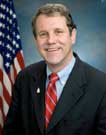|
|
 |
|
The
views expressed
on this page are soley those of the author and do not
necessarily
represent the views of County News Online
|
 |
U.S. Senator Sherrod Brown
Ohioans
Shouldn’t be Left in the Dark on Trade
Ohioans have seen first-hand what so-called free trade agreements have
done to our state and our economy. Bad deals have closed factories,
torn apart families, and devastated communities.
Americans have every right to be skeptical of new trade deals,
particularly the Trans-Pacific Partnership (TPP) — the largest trade
deal ever negotiated.
We have heard “just trust me” from politicians too many times before.
Americans were promised new jobs through foreign trade, but instead
found shuttered factories and a flood of imports from China and Mexico.
The TPP deal between the U.S. and nearly a dozen Asian-Pacific nations
would affect more than 40 percent of our world’s economy. That’s why we
need a transparent process that allows Americans and their elected
representatives to see the text of the agreement.
Unfortunately, with the TPP we have seen the opposite — unprecedented
secrecy.
The President has stated that we should look at the facts before
passing judgment on this agreement, yet it’s nearly impossible for
policymakers — let alone our constituents or the free press—to know
what those facts are. The Administration has made the draft text of the
TPP agreement classified, and kept it hidden from the public.
Even seasoned policy advisors with the requisite security clearances
can’t review text without being accompanied by a Member of Congress.
And yet, there is one group that has had significant access to the
trade deal: the country’s biggest corporations and their lobbyists.
These corporate insiders have had the chance not only to read the deal,
but to shape it.
The Administration has 28 trade advisory committees on different
aspects of the TPP, and 85 percent of the members of these committees
are senior corporate executives or industry lobbyists. In fact, many of
the advisory committees — including those on chemicals and
pharmaceuticals, textiles and clothing, and services and finance — are
made up entirely of industry representatives.
It shouldn’t be easier for multinational corporations to get their
hands on trade text than for public servants looking out for American
workers and American manufacturers. Corporate executives and lobbyists
have had access to this deal for years — it’s time the American people
had a say.
That’s why I am keeping the pressure on the President and his
administration to improve transparency. Until the text of this massive
agreement is made accessible to policy advisers looking out for the
public interest, I will block a key new appointment to the U.S. Trade
Representative’s office, which is negotiating this deal.
Congress has to vote to approve any deal, and should be part of the
process of crafting it. Too much is at stake with this trade deal for
the American people and their elected representatives to be left in the
dark.
|
|
|
|

